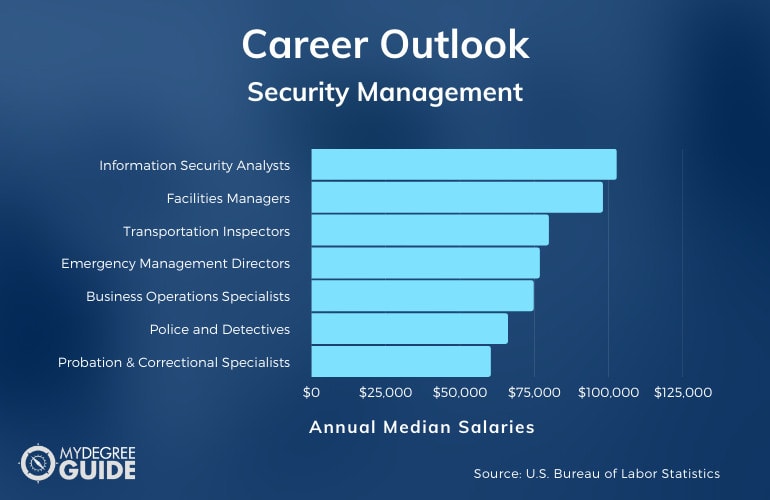A security management degree can help you begin or advance a career in the expansive field of security and protective services.

With the rise of security threats, security experts are in high demand across different sectors, including government organizations, law enforcement agencies, and private businesses and organizations.
Editorial Listing ShortCode:
Aside from physical security, there is also a growing need for information security. A security management degree can help you develop the necessary knowledge and skill sets for this crucial field.
Universities Offering Online Bachelors in Security Management Degree Program
Methodology: The following school list is in alphabetical order. To be included, a college or university must be regionally accredited and offer degree programs online or in a hybrid format.
American Public University
American Public University offers an online program for a Bachelor of Arts in Security Management. Prospective students do not need to take any entrance exams to apply. Courses start every month, and they are 8 or 16 weeks long. Students can choose a concentration in Information Security, Government Security, or Loss Prevention Management.
APUS is accredited by the Higher Learning Commission.
Bellevue University
Bellevue University’s Bachelor of Science in Security Management can be earned on campus or online. Students in the program are given opportunities to build their portfolios. Courses include Risk Analysis and Organizational Security, Security Administration and Management, Physical and Technological Components of Security Management, and more.
Bellevue University is accredited by the Higher Learning Commission.
Capella University
Capella University offers an online program for a Bachelor of Science in Information Technology with a specialization in Information Assurance and Cybersecurity. The program provides immersive lab experiences and aims to prepare students for certification exams from SAS, Cisco, and CompTIA. Coursework includes Cyber Defense and Countermeasures, Computer Forensics, and Cyber Attacks and Ethical Hacking.
Capella University is accredited by the Higher Learning Commission.
National University
National University offers a Bachelor of Science in Homeland Security and Emergency Management that can be earned online or on campus. Applications are accepted on a rolling basis, so students can start year-round. Courses are very flexible and each one is just 4 weeks long.
National University is accredited by the WASC Senior College and University Commission.
Southern New Hampshire University
Southern New Hampshire University offers a BS in Criminal Justice with a concentration in Homeland Security. Students in the program can access their online coursework at any time, and there are no set class meeting times. The program’s instructors have real-world professional experience with police departments and government agencies.
Southern New Hampshire University is accredited by the New England Commission of Higher Education.
University of Alaska – Fairbanks
The University of Alaska—Fairbanks offers a Bachelor of Security and Emergency Management. This flexible degree program is available in online and hybrid formats. The curriculum emphasizes real-world problem-solving and application of knowledge. Coursework includes Introductory Human Resources Management, Fiscal Management of Emergency Management Operations, All-Hazards Risk Analysis, and more.
UAF is accredited by the Northwest Commission on Colleges and Universities.
University of Arizona
The University of Arizona offers a Bachelor of Arts in Homeland Security and Emergency Management. Courses are 5 to 6 weeks long, and students take just one at a time. The program offers 6 different emphases: Supply Chain Management, Real Estate Studies, Health and Wellness, Entrepreneurship, Cognitive Studies, and Business Economics.
The University of Arizona is accredited by the Higher Learning Commission.
University of Phoenix
The University of Phoenix offers a Bachelor of Science in Security Management. Each course in the program is just 5 weeks long. Students in the program take one course at a time, for a total of ten courses per year. The curriculum was developed in collaboration with industry experts, and class sizes average just 19 students.
The University of Phoenix is accredited by the Higher Learning Commission.
University of Texas – El Paso
The University of Texas—El Paso offers a Bachelor of Arts in Security Studies. The program is designed to be convenient and completely online. Coursework includes History and Security, Geography and Security, Modern Strategy, Seminar in Intelligence and National Security Studies, Intelligence Collection and Analysis, and more. The program’s faculty members have practical experience in the field.
The University of Texas at El Paso is accredited by the Southern Association of Colleges and Schools Commission on Colleges.
Webster University
Webster University offers a Bachelor of Arts in Business and Organizational Security Management. Students can take courses in 8 or 9 week periods or in a traditional semester format. Online classes are available in both synchronous and asynchronous formats. The program has job placement rate of almost 95%.
Webster University is accredited by the Higher Learning Commission.
Online Security Management Degrees

Security management typically involves safeguarding and upholding the physical integrity of people, products, and buildings as well as protecting information and telecommunication systems. A bachelor’s degree in security management can prepare students to work in a wide range of security roles in both the private and public sectors.
Here are some potential positions in the field:
- Homeland security agent
- Security manager
- Security guard
- Information security analyst
- Law enforcement officer
- Emergency management director
- TSA screener
Professions in physical security management are tasked with evaluating various risks to security and formulating and implementing strategies to avert various types of security threats. On the other hand, information security management professionals are tasked with securing network and IT infrastructure from cyber security threats.
Security management degrees focus more on security policies and procedures, security logistics, planning, leadership, and management. You can also develop various skills and knowledge in areas such as critical thinking, communication, and assertiveness. You can explore the integration of technology in decision-making as well.
Some of the course topics studied under security management include:
- Security administration
- Fundamentals of business security
- Personal and environmental hazards
- Risk management
- Emergency planning
- Security leadership
- Criminal justice security
- Terrorism and intelligence
- Cyber security
- Crisis response
- Computer networking and forensics
A bachelor’s degree in security management can also enable current security professionals to advance their qualifications for more senior positions in the field. While you can obtain a bachelor’s degree using the traditional on-campus route, many reputable schools also have online program options that tend to offer more scheduling flexibility. Online cyber security degree programs are especially popular among working students.
Security Management Careers & Salaries

A bachelor’s degree in security management can open the pathway to a wide variety of careers both in the private and public sectors of security enforcement and protection.
A college degree in security management is often considered a prerequisite for advancing into senior or leadership positions in the security sector. Notable career paths include corrections officers, federal law enforcement officers, security managers, information security analysts, TSA screeners, and emergency management directors.
According to the Bureau of Labor Statistics, here’s a list of some of the careers within the expansive security management field, along with their median salaries.
| Careers | Annual Median Salaries |
| Information Security Analysts | $102,600 |
| Facilities Managers | $97,930 |
| Transportation Inspectors | $79,770 |
| Emergency Management Directors | $76,730 |
| Business Operations Specialists, All Other (Includes Security Management Specialists) | $74,670 |
| Police and Detectives | $66,020 |
| Probation Officers and Correctional Treatment Specialists | $60,250 |
| First-Line Supervisors of Security Workers | $50,240 |
| Transportation Security Screeners | $45,470 |
| Security Guards | $31,470 |
The positions and salary you may qualify for can differ depending on your level of experience, region, and chosen industry.
Security managers can work in a wide range of industries based on their specialization. According to the Bureau of Labor Statistics, the largest employers of security guards were investigation, guard, and armored car services. Other top industries for security professionals include healthcare, government, educational services, and the hospitality industry.
Security Management Bachelor’s Curriculum & Courses

Here are some examples of courses you’re likely to encounter while undertaking a security management or security administration degree:
- Introduction to Security: In this course, you’ll learn about the basics of security, including but not limited to a general overview of security operations and functions, security in various environments, and intelligence gathering.
- Homeland Security Overview: This course gives you a comprehensive overview of homeland security, and you’ll cover topics like the role of security apparatus at various government levels and how to examine and handle security threats.
- Security Management Ethics: You’ll learn how to achieve a balance between personal values, organizational ethics, international custom, and legal and liability concerns in the field of security management.
- International Terrorism: You’ll get an in-depth look at international terrorism and the threat it continues to pose across the globe. You’ll also learn about intelligence gathering, terrorism investigation, and prevention, among other topics.
- Principles of Information Security and Computer Crime: In this course, you may learn about the guiding principles of information security, cybercrime detection and prevention, cybercrime forensics, and more.
- Security Administration: This course teaches you how to install, maintain, and troubleshoot an organization’s security components or solutions. You’ll also learn how to formulate and implement functional security policies.
- Criminal Justice Security: This core course typically deals with the components of criminal justice, crime and loss prevention, physical security, and more.
- Risk Management: In this course, you’ll explore the different aspects of risk management in regard to security threats. You’ll learn to identify, assess, and control security threats to an entity or organization.
- Security Leadership: This course covers how to lead security organizations and personnel, analyze risk, and formulate security protocols with clear implementation guidelines.
- Emergency Planning and Crisis Response: In this course, you’ll analyze ways that various government agencies, communities, and businesses are prepared to deal with emergencies and security crises.
Some security management programs offer you the chance to specialize in physical security or cyber security.
Admissions Requirements

The admission requirements for a bachelor degree in security management can vary across higher learning institutions, but common criteria include:
- High school diploma or GED equivalent
- Official school transcripts
- Personal essay
- SAT or ACT scores (some schools require this)
Depending on the school, some programs may be geared toward those who have a background in security studies and want to better develop their skills. Some schools may also request letters of recommendation from teachers or mentors.
Accreditation

If you’re pursuing a bachelor’s degree in security management, you’ll likely want your degree to be valid. This is why it’s essential to attend a regionally accredited institution. Credits are more likely to transfer to other degree programs if they’re earned at a regionally accredited school. Attending an accredited school is also a precondition for receiving financial aid.
To receive regional accreditation, institutions can be evaluated by regional accreditation bodies that are recognized by the US Department of Education or the Council for Higher Education Accreditation (CHEA). You can also visit CHEA’s website to verify whether a prospective school holds credible accreditation.
Financial Aid and Scholarships

As you research different security management programs, you can also compare schools’ financial aid options. For instance, many schools offer scholarships based on various factors, such as academic merit, athletics, and area of study.
You can also explore scholarship opportunities from outside organizations. Most students seek federal assistance as well. You can check whether you qualify for federal aid by filling out the Free Application for Federal Student Aid (FAFSA). Your completed FAFSA could also be useful when applying to other need-based aid options, such as state aid.
Student loans are the most common form of government aid, but some students also qualify for grants or work-study programs.
What Is Security Management?

Security management is a field that deals with identifying, assessing, and responding to security risks. It includes developing policies and procedures to protect people, property, and information assets from harm. Security management also involves monitoring compliance with security measures and investigating incidents when they occur.
Security managers typically identify and analyze security risks facing a particular entity and undertake different actions to reduce security threats and prevent any occurrence. In case security threats occur, security managers are also responsible for conducting crisis planning and the appropriate emergency response to control the situation.
Is Security Management a Good Career?
Yes, security management is a good career for many professionals. Every industry—be it information technology, business, or even healthcare—has something to protect. As such, there are many opportunities for professionals who can work in information or physical security management.
If you’re interested in physical security management, overall employment for protective service positions is expected to grow by 8% over the next ten years (Bureau of Labor Statistics). The Bureau of Labor Statistics states that the median salary for facilities managers is $97,930. This job category includes security managers as well as other facilities management professionals.
What Can You Do with a Security Management Major?

A security management major can open doors to a range of professional opportunities in the field of protective service.
Depending on your specialization, you may qualify for different career positions in private security, emergency preparedness, and law enforcement. Security management careers are pretty diverse, with graduates still being eligible to work in other sectors, including NGOs, the military, and state, federal, and local governments.
Security majors may even work in IT and financial companies if they specialize in information security management. A bachelor’s degree in security management can be very versatile and allow you to pursue a range of career paths, depending on your professional goals and area of specialization.
How Long Does It Take to Get a Security Management Degree Online?
If your program follows a 16 week semester, it will generally take 4 years to complete a bachelors program with full-time enrollment.
You might be able to complete your degree within a shorter timeframe if you choose an online option. For instance, if you follow an online program that has 8 week semesters, you can possibly finish in less time if you stay continuously enrolled year-round.
A security management degree program usually has around 120 credits, including core program credits, general education credits, and elective credits.
Is a Bachelor’s Degree in Security Management Worth It?

Yes, a bachelor’s degree in security management is worth it for many students. With the growing security concern across the globe—including terrorism, organized crime, and cybercrimes—the demand for security managers will continue to grow as well.
According to the Bureau of Labor Statistics, protective service occupations are expected to see 8% job growth over the next ten years, and 33% job growth is projected for information security analysts. Common careers in this field include security manager, information security manager, TSA screener, homeland security agent, and emergency management director.
Getting Your Bachelors in Security Management Degree Online

If you’re passionate about security, undertaking a bachelor’s in security management degree could be a strategic step toward senior or leadership roles in the field.
Many reputable schools now offer security management degrees online as well. Online programming can often be a more affordable route that offers greater flexibility. You can research the different online security management degree programs available to choose the one that best suits you and you may even want to consider earning an online graduate certificate in cyber security after you complete your bachelor’s degree.
Most security management programs emphasize either physical security or information security, so you might start by searching for programs that specialize in whichever track interests you most. The sooner you start exploring accredited schools, the sooner you can get started on your educational journey.
